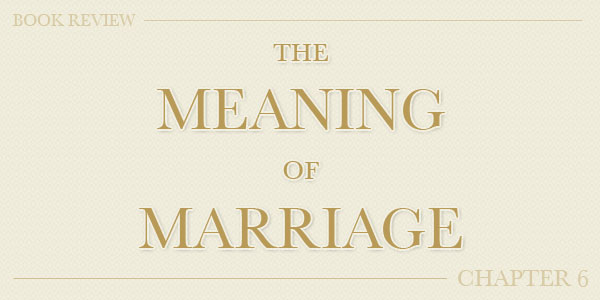
Chapter 6 – Embracing The Other
This chapter is written by Kathy Keller, TImothy’s wife. She graciously addresses the often times controversial issue of gender roles in marriage.
She begins by stating,
“..the differences between men and women will become an unavoidable issue in every marriage.” (170)
Every husband and wife enters marriage with some sort of expectation for gender roles, based off how they were raised, other contributing elements in one’s culture such as friends or even television shows, and personal preference.
No matter what one’s views are regarding gender roles in marriage, I absolutely agree with Kathy as she points out the truths established in our great design.
“In the image of God He created him; male and female He created them. (Genesis 1:26) This means that our maleness or our femaleness is not incidental to our humanness but constitutes its very essence.” – (172)
Kathy continues to explain that God’s design of male and female are equal in dignity and worth, but were intended to be complementary. For example, in Genesis God tells us to be fruitful and fill the earth, although neither sex can do that on their own. Reproduction requires a complementary union of the two different sexes. So right from the beginning we see that although God made us in His image, males and females are different.
Kathy addresses that our differences should not be seen as superior or inferior, nor should we get caught up in the specific “duties” our current culture may feel are appropriate. Rather, our goal should be to look at the roles Christ exemplified for us. The main role that I want to share is one of the most stirring ones that Christ fulfilled which is submission.
So often it seems that word is a grenade, and when used everything around it explodes.
I appreciate how Kathy acknowledges how Christ’s submission was voluntary. Jesus’ submission to God in lowering Himself was a gift He offered to His father.
Kathy humbly writes,
“I discovered here that my submission in marriage was a gift I offered, not a duty coerced from me.” (175)
Submission is a gift we offer.
God the Father accepts Jesus’ gift and then exalts His Son to the highest of all honors. Likewise in marriage, husbands and wives both have an opportunity to gift submission, and exalt one another with love and honor. When looked at it this way submission becomes beautiful, rather than a ticking time bomb.
Kathy continues to encourage the readers the importance of embracing one another – differences and all – in marriage.
“Men and women are not interchangeable, unisex beings, but they have different strengths that result in men and women solving problems, building consensus, and performing leadership functions in distinct ways.” (179)
Male and female He created them… differently! And our differences are ok!
Marriage requires that we fully embrace the other sex. This means that we need to be ok with our differences, affirming each other’s strengths and encouraging each other to grow in areas of weakness. Males and females are radically different and yet they complement each other.
“A person of one’s own sex is not as likely to have as much Otherness to embrace. But God’s plan for married couples involves embracing the otherness to make us unified, and that can only happen between a man and a woman.” (182)
Our differences need to be embraced in marriage! If we choose not to embrace our gender differences then tension will arise.
“Husbands and wives grow distant from one another because they allow themselves to engage in a constant, daily drumbeat of thoughts of inner disdain for the gendered difference of their spouse.” (183)
It is imperative that we embrace Otherness.
“Two people of different sexes make the commitment and sacrifice that is involved in embracing the Other. It is often painful, and always complicated, but it helps us grow and mature in ways no other experience can produce, and it brings about deep unity because of the profound complementarity between the sexes.” (184)
I am so glad that Kathy did not go into detail about which gender is responsible for what in marriage. That would have been distracting as every reader I am sure would find something to disagree about. The truth is that the Bible transcends culture, giving us the freedom to determine the particulars within our own marriages. Every husband and every wife has strengths and weaknesses that should be addressed in marriage, and then agreed roles can be delegated accordingly. The important thing to remember is to study the examples Christ lead for us and live them out daily, embrace one another in love and do not allow chasms of gender roles to erode your relationship.
For those of you who do not feel as though you are on the same page as your spouse, I hope this encourages you:
“One of the pillars of wise counseling is the statement, ‘The only person over whom you have control is yourself.’ You can change no one’s behavior but your own.” (191)
GET The Meaning Of Marriage: Facing The Complexities Of Commitment With The Wisdom Of God HERE
Check out each Chapter Review below!